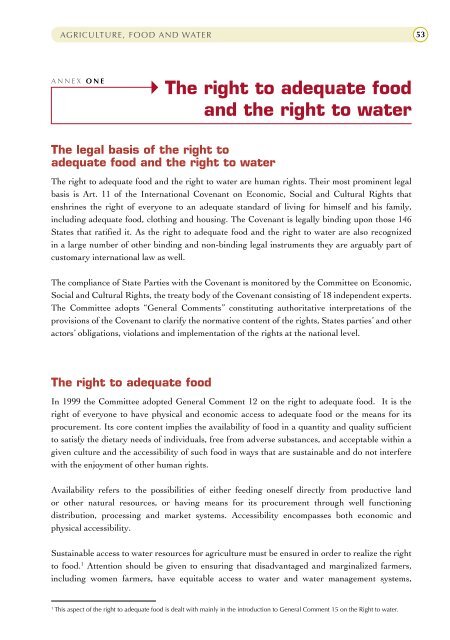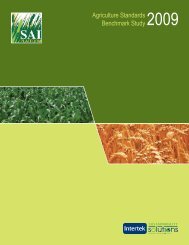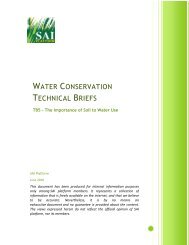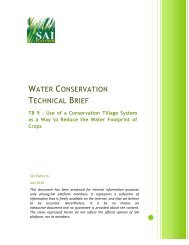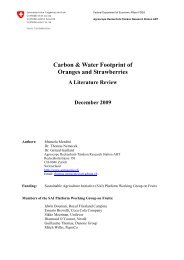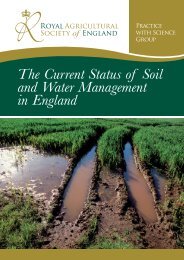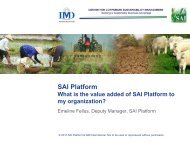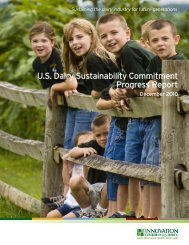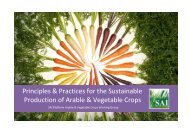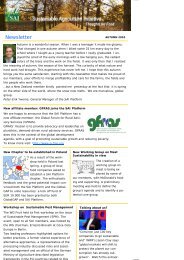Agriculture, food and water - FAO.org
Agriculture, food and water - FAO.org
Agriculture, food and water - FAO.org
You also want an ePaper? Increase the reach of your titles
YUMPU automatically turns print PDFs into web optimized ePapers that Google loves.
AGRICULTURE, FOOD AND WATER<br />
53<br />
ANNEX ONE<br />
The right to adequate <strong>food</strong><br />
<strong>and</strong> the right to <strong>water</strong><br />
The legal basis of the right to<br />
adequate <strong>food</strong> <strong>and</strong> the right to <strong>water</strong><br />
The right to adequate <strong>food</strong> <strong>and</strong> the right to <strong>water</strong> are human rights. Their most prominent legal<br />
basis is Art. 11 of the International Covenant on Economic, Social <strong>and</strong> Cultural Rights that<br />
enshrines the right of everyone to an adequate st<strong>and</strong>ard of living for himself <strong>and</strong> his family,<br />
including adequate <strong>food</strong>, clothing <strong>and</strong> housing. The Covenant is legally binding upon those 146<br />
States that ratified it. As the right to adequate <strong>food</strong> <strong>and</strong> the right to <strong>water</strong> are also recognized<br />
in a large number of other binding <strong>and</strong> non-binding legal instruments they are arguably part of<br />
customary international law as well.<br />
The compliance of State Parties with the Covenant is monitored by the Committee on Economic,<br />
Social <strong>and</strong> Cultural Rights, the treaty body of the Covenant consisting of 18 independent experts.<br />
The Committee adopts “General Comments” constituting authoritative interpretations of the<br />
provisions of the Covenant to clarify the normative content of the rights, States parties’ <strong>and</strong> other<br />
actors’ obligations, violations <strong>and</strong> implementation of the rights at the national level.<br />
The right to adequate <strong>food</strong><br />
In 1999 the Committee adopted General Comment 12 on the right to adequate <strong>food</strong>. It is the<br />
right of everyone to have physical <strong>and</strong> economic access to adequate <strong>food</strong> or the means for its<br />
procurement. Its core content implies the availability of <strong>food</strong> in a quantity <strong>and</strong> quality sufficient<br />
to satisfy the dietary needs of individuals, free from adverse substances, <strong>and</strong> acceptable within a<br />
given culture <strong>and</strong> the accessibility of such <strong>food</strong> in ways that are sustainable <strong>and</strong> do not interfere<br />
with the enjoyment of other human rights.<br />
Availability refers to the possibilities of either feeding oneself directly from productive l<strong>and</strong><br />
or other natural resources, or having means for its procurement through well functioning<br />
distribution, processing <strong>and</strong> market systems. Accessibility encompasses both economic <strong>and</strong><br />
physical accessibility.<br />
Sustainable access to <strong>water</strong> resources for agriculture must be ensured in order to realize the right<br />
to <strong>food</strong>. 1 Attention should be given to ensuring that disadvantaged <strong>and</strong> marginalized farmers,<br />
including women farmers, have equitable access to <strong>water</strong> <strong>and</strong> <strong>water</strong> management systems,<br />
1<br />
This aspect of the right to adequate <strong>food</strong> is dealt with mainly in the introduction to General Comment 15 on the Right to <strong>water</strong>.


